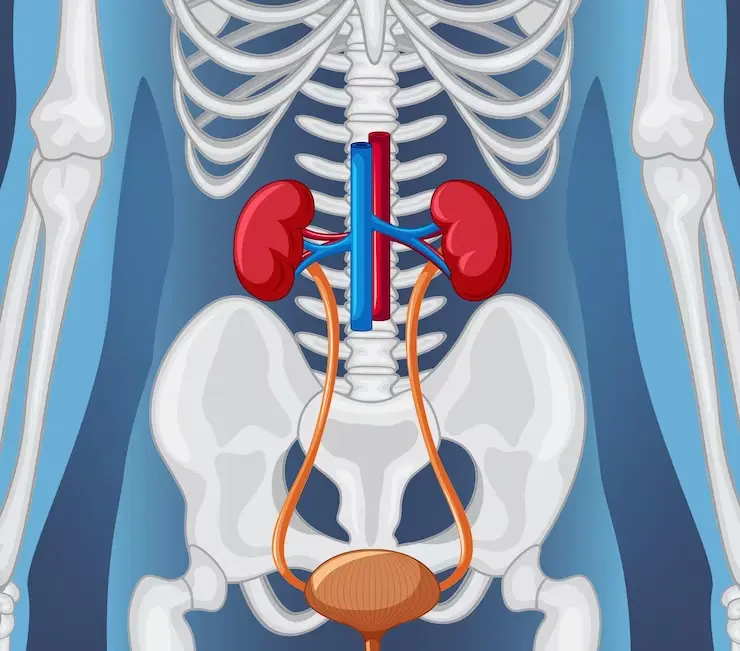Preventive Healthcare
All You Need To Know About Nephrotic Syndrome
2269 Views
0

What is Nephrotic Syndrome?
Nephrotic syndrome is a renal disorder where the kidneys expel excessive protein into the urine. This condition often stems from damage to the small blood vessels in the kidneys responsible for filtering waste and excess water from the blood.
Is Nephrotic Syndrome Life-Threatening?
Although the prognosis of nephrotic syndrome is generally favourable, neglecting treatment for nephrotic syndrome can escalate its severity, posing potential life-threatening risks.
Who Does Nephrotic Syndrome Affect?
Nephrotic syndrome can occur in children of various age groups, but it predominantly impacts those between 2 and 7 years old, with a higher prevalence among boys.
How Common is Nephrotic Syndrome?
Nephrotic syndrome is uncommon among children, with an annual incidence of fewer than 5 cases per 100,000 children worldwide, on average.
How Does Nephrotic Syndrome Affect My Body?
Nephrotic syndrome impacts the body by causing abnormal leakage of excess protein from the blood into the urine due to damage to the glomeruli. The dysfunction of kidney filters, resulting from an underlying disease, disrupts the normal kidney filtering process, leading to increased protein released into the urine.
What are the Symptoms of Nephrotic Syndrome?
Common nephrotic syndrome symptoms include:
- Elevated protein albumin (greater than 3.5 grams) in urine (albuminuria)
- High levels of fat and cholesterol in the blood (hyperlipidemia)
- Swelling (oedema), typically in the legs, feet, or ankles, with possible occurrence in hands or face
- Low levels of albumin in the blood (hypoalbuminemia)
- Loss of appetite
- Feeling unwell or sick
- Abdominal pain (from ribs to pelvis).
- Foamy urine
- Deficiency of essential minerals and vitamins like calcium and vitamin D
What are the Complications of Nephrotic Syndrome?
The nephrotic syndrome complications are enumerated as follows:
- Infections
- Thromboembolism
- Cardiovascular Complications
- Hypovolemic Crisis
- Anemia
- Acute Renal Failure (ARF)
- Oedema
- Hormonal and Mineral Alterations
- Intussusceptions
What Causes Nephrotic Syndrome?
Nephrotic syndrome may arise from conditions affecting the kidneys directly or underlying diseases that impact the entire body. Common nephrotic syndrome causes include:
- Minimal change disease: Causes minor alterations in kidney filters.
- Focal Segmental Glomerulosclerosis: Results in accumulating scar tissue in kidney filters.
- Membranous glomerulopathy (glomerulus nephropathy): Thickens the lining of kidney filters.
- Nephritis: Kidney inflammation.
Systemic conditions contributing to nephrotic syndrome causes:
- Diabetes mellitus
- Lupus
- Multiple myeloma
- Certain cancers
- Infections like Hepatitis B or malaria
How Do You Diagnose Nephrotic Syndrome?
There are various ways by which diagnosis of nephrotic syndrome is done. These include:
- Urinalysis
- Detects high protein concentration key nephrotic syndrome symptoms.
- Dipstick test for albumin presence in a urine sample.
- A 24-hour urine sample or albumin-to-creatinine ratio is needed for accurate protein measurement.
- Thresholds for diagnosis: >3.5g/17.73m² in adults, >40mg/m² per hour in children.
- Blood Tests
- Identifies hypoalbuminemia, low levels of albumin, and proteins in the blood.
- Detects hypertriglyceridemia and hypercholesterolemia linked to nephrotic syndrome.
- Measures serum creatinine and blood urea for overall kidney function monitoring.
- Kidney Biopsy
- Confirms diagnosis and determines the nephrotic syndrome cause.
- It involves a needle biopsy to obtain a kidney tissue sample.
- Performed in a hospital setting with light sedation and local anaesthetic.
Is Nephrotic Syndrome Curable?
Nephrotic syndrome is manageable but often not curable. Nephrotic Syndrome treatment addresses underlying causes, manages symptoms, and prevents complications with varying individual outcomes. Regular monitoring and follow-up are crucial to assess the response to nephrotic syndrome treatment and adjust as needed.
How can I prevent nephrotic syndrome?
You cannot prevent specific nephrotic syndrome causes, but you can take steps to safeguard your glomeruli:
- Manage high blood pressure and diabetes, if applicable.
- Ensure you receive vaccinations for common infections, such as influenza, pneumonia, etc, especially if you are in close contact with individuals with hepatitis.
- If your doctor prescribes antibiotics, take them as directed and complete the entire prescription, even if symptoms improve.
What Can I Expect If I Have Nephrotic Syndrome?
While nephrotic syndrome can be a severe condition, the majority of individuals respond positively to treatment and can lead a normal life. Depending on the cause, you may observe improvements within a few days, but it might take several weeks or even months for a complete response to nephrotic syndrome therapy.
When to See a Doctor?
If you are experiencing symptoms like foamy urine, loss of appetite, or oedema indicative of nephrotic syndrome, it is crucial to reach out to a doctor promptly. Also, seek medical attention if your symptoms worsen or new symptoms emerge.
What's the Difference Between Nephrotic Syndrome and Nephritic Syndrome?
Nephrotic syndrome and nephritic syndrome, both kidney disorders, exhibit distinct features.
- Nephrotic syndrome is identified by severe proteinuria, significant oedema, and typically normal blood pressure. Conversely, the nephritic syndrome is characterised by hematuria, hypertension, and moderate glomerular damage.
- In nephrotic syndrome, there are high levels of protein in urine, low protein levels in the blood, and bodily swelling. However, in nephritic syndrome, inflammation occurs, potentially leading to visible blood in the urine.
What's the Difference Between Nephrotic Syndrome and Glomerulonephritis?
Nephrotic syndrome and glomerulonephritis are separate kidney conditions.
- Nephrotic syndrome is identified by severe proteinuria, low protein levels in the blood, and bodily swelling. In contrast, glomerulonephritis encompasses a group of diseases causing inflammation and harm to the kidney's filtering units (glomeruli).
- While glomerulonephritis is a specific disease type, nephrotic syndrome describes symptoms related to kidney problems.
What is Congenital Nephrotic Syndrome?
Congenital nephrotic syndrome, an inherited condition marked by urinary protein and body swelling, predominantly affects families of Finnish descent and manifests shortly after birth.
Conclusion
Nephrotic syndrome is a kidney disorder characterised by excessive protein in urine, swelling, and potential health complications. While it primarily affects children, prompt diagnosis and appropriate treatment, often involving medications like prednisone, can lead to positive outcomes. Understanding the symptoms, causes, and distinctions between nephrotic syndrome and related conditions like glomerulonephritis is crucial for effective management. Regular medical check-ups, significantly if symptoms arise, can contribute to a healthier life with nephrotic syndrome medication. Embark on your path to nephrotic syndrome treatment with tailored health insights. Metropolis Healthcare offers affordable urine analysis, blood tests, and kidney biopsies, empowering you to monitor your progress. Book your test today for expert guidance on nephrotic syndrome therapy and prognosis.























 WhatsApp
WhatsApp